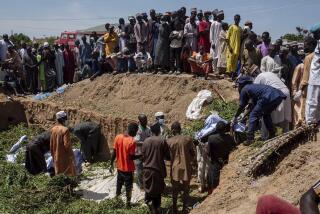Anger Mounts Over Deadly Blast
NAIROBI, Kenya — Angry residents of Nigeria’s largest city called Tuesday for the country’s military to be held accountable for the deaths of hundreds of people who tried to flee a huge explosion at an army munitions depot over the weekend.
Late Tuesday, rescue workers were still retrieving bodies from drainage canals that people had jumped or driven their vehicles into in a panicked attempt to escape a series of blasts. People who plunged into the canals, which were partly covered with water hyacinths, apparently thought the water was shallow, witnesses said. Unable to swim, many drowned within minutes.
Authorities confirmed that more than 600 bodies had been recovered. Most of the victims were the wives and children of soldiers stationed at the Ikeja base, one of several military facilities crammed into densely populated Lagos.
Some Nigerian news agencies reported that the death toll could reach 2,000 because hundreds of people were still missing. Dozens of children who fled their homes were being sheltered in mosques, churches and police stations as authorities searched for their parents.
Lagos residents said they were still traumatized by the three hours of explosions that set off rockets, rained down shrapnel and lighted the Sunday night sky with huge fireballs.
They told reporters that they first thought the artillery blasts were another coup. Nigeria has suffered several successful coups and 30 years of military rule since gaining independence from Britain in 1960.
The country has been on edge for the last several months amid a wave of ethnic and religious violence that has left hundreds of people dead. Nigeria’s much-admired attorney general and justice minister, Bola Ige, was among several prominent politicians who have been assassinated recently.
On Monday evening, President Olusegun Obasanjo visited the explosion site and declared a national day of mourning. Drowning out angry hecklers who accused his government of negligence, Obasanjo promised help for the survivors and said a military panel would investigate the explosion, the cause of which remained unknown.
“What happened in Lagos was a monumental tragedy,” Obasanjo, who was elected nearly three years ago, said in a televised address to the nation. “Over 600 people, mostly children and youths, died. . . . It was a national disaster.”
In the late 1970s, when he was the country’s military ruler, Obasanjo ordered the renovation of the Ikeja munitions depot. Since then, the base, along with other military facilities in Lagos, has fallen into disrepair.
Blame for the explosion fell mainly on military leaders. Members of the Army Wives Assn. said that a smaller blast had erupted at the barracks’ weapons dump last year and that the base’s top officers had been warned that the area was unsafe for soldiers, their families and the thousands of people who live in a surrounding neighborhood of middle-class homes.
Among the most vocal critics of the military was Lagos state Gov. Bola Tinubu, a former political prisoner. He charged that the explosion “was not caused by any government but by the military.”
Leading human rights activists called on Obasanjo to appoint an independent commission of inquiry--not a military panel--to investigate the blast.
“We cannot trust the army to find the right answers,” Ayo Obe, the president of the Civil Liberties Organization, Nigeria’s oldest human rights group, told The Times. “The army is not going to tell us why all these heavy bombs were stashed in the center of this neighborhood, or why there was no disaster preparedness to help the people.”
Tinubu, the state governor, urged the military to remove all its heavy artillery from the bases in the city.
“They could put their weapons and bombs a safer distance from the people,” he said.
*
Times wire services contributed to this report.
More to Read
Sign up for Essential California
The most important California stories and recommendations in your inbox every morning.
You may occasionally receive promotional content from the Los Angeles Times.










